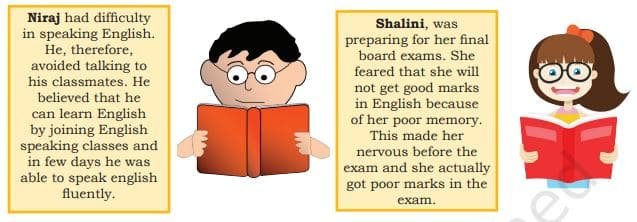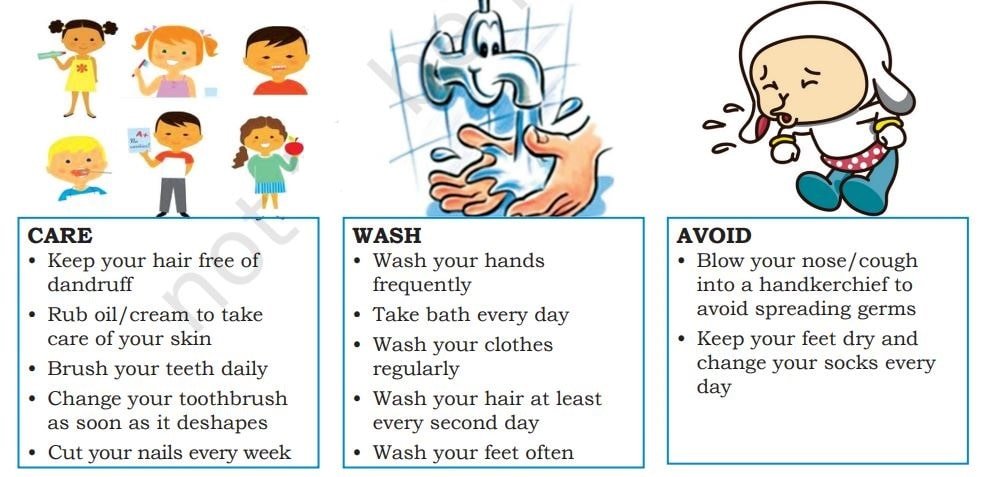Self Management Skills Class 9 Notes offers the important study materials that can help students prepare for exams, including the CBSE and other competitive exams. All the important Information are taken from the CBSE Textbook Employability Skills Class IX Based on CBSE Pattern.

Self Management Skills Class 9 Notes
Self-management, which is also referred to as ‘selfcontrol’ or ‘self-regulation’, is the ability to regulate one’s emotions, thoughts, and behaviour effectively in different situations.
Session 1: Introduction to Self-Management
Self-management involves understanding yourself, understanding what your interests and abilities are, having a positive attitude and grooming yourself in order to develop self-confidence.
Self-management can also help in:
- developing good habits
- overcoming bad habits
- reaching your goals
- overcoming challenges and difficulties
Self-management skills include the following:
- Self-awareness – Knowing yourself as an individual – your values, likes, dislikes, strengths and weaknesses.
- Self-control – Ability to control your behaviour, discipline, etc.
- Self-confidence – Believing in yourself that you can do any task that is given to you and not scared of taking risks.
- Self-motivation – Doing tasks on your own without any external motivation.
- Positive thinking – Expressing certainty or affirmation even in tough situations.
- Problem solving – Understanding a problem and finding a solution using step-by-step method.
- Team work – Working together with people to accomplish shared goals.
- Time management – Achieving tasks on time and according the plan.
- Goal setting – Planning concrete goals to be accomplished within a set timeframe.
- Personal hygiene and grooming – Keeping oneself clean, healthy and smart.
Session 2: Strength and Weakness Analysis
Knowing yourself: To find strengths and weaknesses
Strengths and weaknesses help to analyze yourself, knowing about yourself, what makes you happy, trying to find the area of improvement, what your opinions are, etc.
Strength and weakness analysis
- Strength – Strengths are what we do well and are good at. Everyone has some strengths.
- Weaknesses – Weaknesses, also known as ‘areas of improvement’ are what we do not do well and are not good at. Everyone has some weaknesses too.

Identifying strengths –
- Take time off to think about what you do well
- Think of anything that you are always good at
- Think about what others appreciate about you
Identifying weaknesses –
- Point out the areas where you struggle and what you find difficult to do
- Look at the feedback you receive from others
- Be open to feedback and accept your weaknesses without feeling small about it. Look at it as an area of improvement.
Difference between interests and abilities
- Interest – Interests are the things that we enjoy doing. Interests may include:
- Activities you want to learn or would like to do in the future.
- Activities you like to do at school and in your free time that make you happy.
- Activities you are curious about or would do even if no one asked you to do it.
- Ability – Ability is an acquired or natural capacity that enables an individual to perform a particular job or task with considerable proficiency.
Session 3: Self-Confidence
What do you mean by Self-Confidence?
Self-confidence is a sense of trusting own’s abilities and self. People who are confident believe that they can do anything given to them in any situation.
Examples of confidence and lack of confidence

Qualities of self-confident people
- Self-belief – they have a belief in themselves, and they can achieve anything.
- Hard Work – They are hard-working people to achieve their goal.
- Positive Attitude – They have a positive attitude towards their goal.
- Commitment – They are committed to achieving the goal in their life.
Building self-confidence
The three steps to building self-confidence are as follows –

Given below are some factors that decrease selfconfidence.
- When we think we cannot do a particular work.
- When we keep thinking of our past mistakes and feel bad about it, instead of learning from them.
- When we expect to be successful at the first attempt itself and do not try again.
- When we are surrounded by people who have a negative attitude, which is reflected in their speech.
Session 4: Positive Thinking
What is Positive-Thinking?
Positive-thinking people have a positive attitude towards life and its challenges. A positive-thinking person looks at the good in things and works towards improving them rather than worrying and/or looking for the bad in things.
Positive thinking leads to good results for you like –
- Overcoming challenges,
- Making you do well or making you an energetic individual,
- Helping you get better at work, and
- Making you and people around you happy.
How to keep your thinking positive?
There are four simple steps to make a positive attitude in life. Let us understand this with the help of
the abbreviation ‘SMILE’.
- S – Start your day in a positive way
- M – Manage time to relax
- I – Imagine the best in any situation
- L – Learn to take feedback in a positive way
- E – Express gratitude
Session 5: Personal Hygiene
It is the habit or practice of keeping ourselves clean. Cleanliness helps us to maintain our health and well-being.
Personal hygiene is important because, it helps us
- stay healthy.
- create a good image of ourselves.
- avoid feeling ashamed in public due to our bad breadth, body odour, etc.
Three steps to personal hygiene –

Session 6: Grooming
What is Grooming?
Grooming is the process of making yourself look neat, tidy and smart. Dressing and grooming are important because they help us –
- make a good impression of ourselves
- look smart
- feel confident about ourselves
Guidelines for dressing and grooming
- Clothes should be clean, neat, and ironed
- Shoes should be clean and polished
- Change socks everyday and always wear clean socks
- Hair should be washed regularly to keep clean
- Simple hair styles and well combed hair gives a smart look
- Face looks clean if you shave regularly
- Moustache should be neatly trimmed
Employability Skills Class 9 Notes
- Communication Skills Class 9 Notes
- Self Management Skills Class 9 Notes
- Basic ICT Skills Class 9 Notes
- Entrepreneurial Skills Class 9 Notes
- Green Skills Class 9 Notes
Employability Skills Class 9 MCQ
- Communication Skills Class 9 MCQ
- Self Management Skills Class 9 MCQ
- Basic ICT Skills Class 9 MCQ
- Entrepreneurship Skills Class 9 MCQ
- Green Skills Class 9 MCQ
Employability Skills Class 9 Questions and Answer
- Communication Skills Class 9 Questions and Answers
- Self Management Skills Class 9 Questions and Answers
- Basic ICT Skills Class 9 Questions and Answers
- Entrepreneurial Skills Class 9 Questions and Answers
- Green Skills Class 9 Questions and Answers
Disclaimer: We have taken an effort to provide you with the accurate handout of “Self Management Skills Class 9 Notes“. If you feel that there is any error or mistake, please contact me at anuraganand2017@gmail.com. The above CBSE study material present on our websites is for education purpose, not our copyrights. All the above content and Screenshot are taken from Employability Skills Class 9 CBSE Textbook and Support Material which is present in CBSEACADEMIC website, This Textbook and Support Material are legally copyright by Central Board of Secondary Education. We are only providing a medium and helping the students to improve the performances in the examination.
For more information, refer to the official CBSE textbooks available at cbseacademic.nic.in

Wawww
very nice!!
exellent!!
very nice!!
very use full thanks for making this
very nice
it’s very helpful.
NICE.
it is easy to learn
Yipeeeee!!!
It’s really impressive
Mast hai
I am watching the notes the day before my exam and these are good notes for you all for class 9th 😌
Very easy explanation ????
This is a wonderful self
WOW
This is a very best
I am student of class 9th